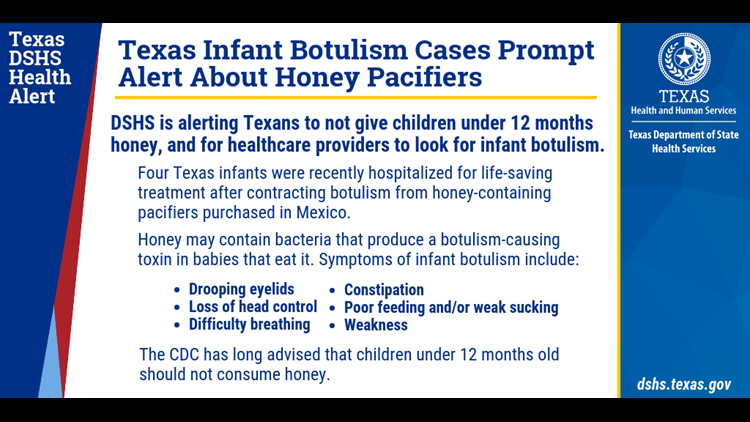TEXAS — After four infants in Texas were treated for botulism, the Texas Department of State Health Services is warning parents and other adults not to give babies pacifiers containing honey. Health officials say the infants had each been given a honey-containing pacifier. The pacifiers were said to have been purchased in Mexico.
On Friday, DSHS reported the four illnesses occurred from mid-August to the end of October and caused all four infants to be hospitalized for life-saving treatment.
The infants were unrelated and are residents of West Texas, North Texas and South Texas.
Health officials say botulism is a serious illness which is caused by a toxin that attacks the body’s nerves. The toxin can cause difficulty breathing, paralysis, and even death. Honey may contain bacteria that produce the toxin in the intestine of infants that consume it.
By the time children are 12 months old, health officials say they have developed enough other types of bacteria in their digestive tract to prevent the botulism bacteria from growing and producing toxin.
On Friday, DSHS also issued a health alert asking healthcare providers to watch for cases of infant botulism and remind parents not to let babies eat honey. The Centers for Disease Control and Prevention and the American Academy of Pediatrics have long advised that children under 12 months old should not consume honey.
According to a press release from the department, honey-filled pacifiers are not commonly sold in the United States, but may be available in some specialty stores and online retailers. Although most of the products are not designed for the honey to be consumed, some have reportedly had a small hole, so a child could eat the honey, or the pacifier could accidentally rupture or leak.
Parents should also avoid pacifiers containing any other food substance, because they could also pose a risk of botulism, DSHS said.
Texas has reported seven to eight cases of infant botulism annually in recent years. Ten confirmed, or suspected, cases have been reported in 2018.



